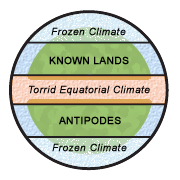Antichthones: Difference between revisions
m Robot - Removing category Greek loanwords per CFD at Wikipedia:Categories for discussion/Log/2013 January 15. |
"contra" and "terra" are Latin, not Greek -- they do not transliterate the Greek script given here! |
||
| Line 1: | Line 1: | ||
{{distinguish|Autochthon (disambiguation){{!}}autochthon}} |
{{distinguish|Autochthon (disambiguation){{!}}autochthon}} |
||
'''Antichthones''', in [[geography]], are those peoples who inhabit the [[antipodes]], countries on opposite sides of the [[Earth]]. The word is compounded of the [[Greek language|Greek]] ''ὰντὶ'' |
'''Antichthones''', in [[geography]], are those peoples who inhabit the [[antipodes]], countries on opposite sides of the [[Earth]]. The word is compounded of the [[Greek language|Greek]] ''ὰντὶ'' and ''χθών''. |
||
[[Image:Climatic zones and antipodes.png|180px|right]] |
[[Image:Climatic zones and antipodes.png|180px|right]] |
||
Revision as of 19:09, 10 November 2013
Antichthones, in geography, are those peoples who inhabit the antipodes, countries on opposite sides of the Earth. The word is compounded of the Greek ὰντὶ and χθών.

Classical and Medieval Europe considered the Earth to be divided by the equator into two hemispheres, the northern and southern; those who inhabited one of these hemispheres were said to be antichthones to those of the other. This idea was expounded by Mela and other Classical authors, though Christian writers, who believed that all people on earth must be descended from Adam, denied the possibility that any southern land, if it existed, could be inhabited by humans. St. Augustine, arguing from a position of scriptural inerrancy, wrote in his City of God "it is too absurd to say, that some men might have taken ship and traversed the whole wide ocean, and crossed from this side of the world to the other, and that thus even the inhabitants of that distant region are descended from that one first man."[1]
See also
References
- ^ Dods, Marcus (translator); St. Augustine (1890). "Chapter 9.—Whether We are to Believe in the Antipodes.". St. Augustine's City of God and Christian Doctrine. Vol. 2. New York, New York: The Christian Literature Publishing Co. Retrieved 2010-12-15.
{{cite book}}:|archive-url=is malformed: timestamp (help);|first1=has generic name (help);|work=ignored (help); Unknown parameter|editors=ignored (|editor=suggested) (help)
![]() This article incorporates text from a publication now in the public domain: Chambers, Ephraim, ed. (1728). "Antichthones". Cyclopædia, or an Universal Dictionary of Arts and Sciences (1st ed.). James and John Knapton, et al.
This article incorporates text from a publication now in the public domain: Chambers, Ephraim, ed. (1728). "Antichthones". Cyclopædia, or an Universal Dictionary of Arts and Sciences (1st ed.). James and John Knapton, et al.
